- Stocks on track for one of the best first halves on record
- Delta variant concerns increasing globally
- Oil falls despite tightening demand
- The OECD meets in Paris to finalize a proposal to overhaul global minimum corporate taxation Wednesday.
- China’s President Xi Jinping will deliver a speech as the nation marks the 100th anniversary of the founding of the Chinese Communist Party on Thursday.
- ECB President Christine Lagarde speaks Friday.
- The US jobs report is released on Friday.
- The FTSE 100 increased 0.3%
- The STOXX 600 rose 0.4%
- Futures on the S&P 500 were little changed
- Futures on the NASDAQ 100 fell 0.1%
- Futures on the Dow Jones Industrial Average rose 0.2%
- The MSCI Asia Pacific Index fell 0.6%
- The MSCI Emerging Markets Index fell 0.4%
- The Dollar Index was little changed
- The British pound fell 0.1% to $1.3863
- The euro fell 0.1% to $1.1911
- The Japanese yen was little changed at 110.67 per dollar
- The offshore yuan was unchanged at 6.4630 per dollar
- The yield on 10-year Treasuries was little changed at 1.48%
- Britain’s 10-year yield advanced two basis points to 0.74%
- Germany’s 10-year yield was little changed at -0.19%
- Brent crude fell 0.1% to $74.60 a barrel
- Spot gold fell 0.2% to $1,774.83 an ounce
Key Events
US futures on the Dow, S&P, NASDAQ and Russell 2000 were wavering in pre-US market trading on Tuesday after the S&P 500 and NASDAQ hit new record highs during Monday's Wall Street session, driven by the technology sector. Contracts on the Dow, whose underlying index lists a variety of mega cap value stocks neglected during the lockdown were this morning's strongest performers.
European stocks rebounded with value shares. Markets in Asia suffered losses on continued concerns over the Delta variant, which is threatening to further damage the global economic recovery. The dollar recovery persisted.
Global Financial Affairs
We're seeing both sides of the reflation trade today, in various parts of the world. European markets are rising with value sectors. The STOXX 600 Index opened 0.4% higher, boosted by industrial, financial and mining companies—sectors expected to gain with an economic recovery. The pan-European gauge, however, was dragged down slightly by cruise operators and airlines on fears that the highly contagious Delta strain of COVID-19 will spur the return of lockdowns.
Asia was painted red, with all major indices closing lower. Hong Kong’s Hang Seng fell 1.1%, underperforming, followed by the Shanghai Composite, which gave away 0.9% of value. Traders are concerned by the rapidly spreading Delta variant; the situation could change quickly, as we saw last year.
The divide between value and growth stocks has been shifting at an ever-increasing pace. On June 20, we outlined how growth stocks—which outperform during economic contraction—were dominant this year, in multiple time frames. Then, on Sunday we showed how that trend was shifting, back to value stocks, which do better during economic recoveries. Finally, yesterday, it was tech stocks that led the market to new heights, adding $6 trillion in value to the stock market. Perhaps, the balance between value and growth is becoming difficult to maintain.
Two anti-monopoly lawsuits against Facebook (NASDAQ:FB) were dismissed yesterday, driving shares in the social media giant up over 4%. The decision also benefited other large players in the sector including Apple (NASDAQ:AAPL), Amazon (NASDAQ:AMZN) and Zoom Video (NASDAQ:ZM) which all closed higher.
Cruise operators sank and airlines crashed after Asia and Europe reimposed limits on travel from the UK, which is suffering from a spike in cases of the Delta variant.
With stocks on track for one of their best first halves in history, the debate over elevated valuations has returned to the fore of investors' minds. The S&P 500 is trading above the average of the past decade, and this quarter may potentially mark the peak of profit recovery from the depths of the pandemic. Meantime, demand for protection against losses in coming months has risen in the options market.
A reduction in private money from individuals and companies flowing into equities has counteracted some inflation concerns, according to The Leuthold Group’s Jim Paulsen, who became a legend in markets after making almost $4 billion shorting the US housing market in 2007.
On the other hand, yesterday investors increased holdings in the 10-year Treasury note on inflation concerns. Today, yields rose slightly, paring yesterday’s slide.
The dollar rose for the fifth straight day.
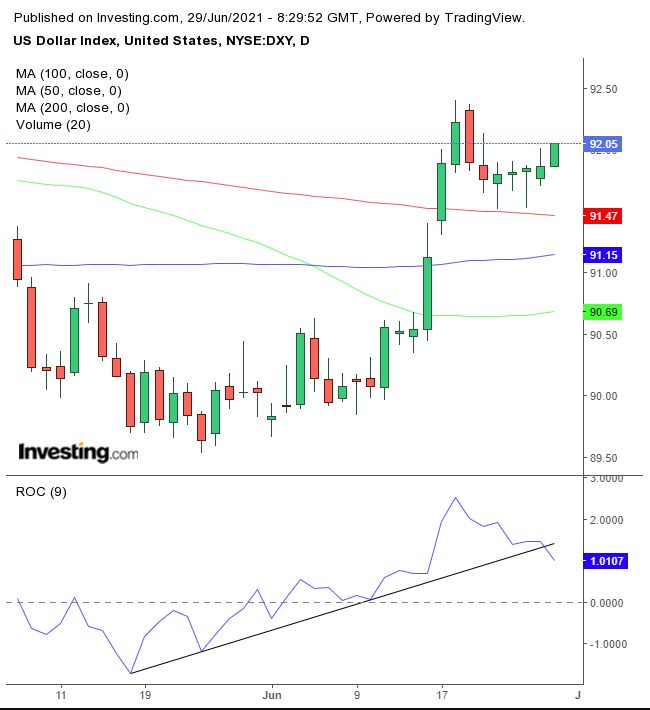
The greenback had found support by the 200 DMA but that didn’t seem to impress the ROC, which has been ticking lower during this rally, providing a negative divergence, which brought it below its uptrend line.
Gold is completing a bearish pennant.
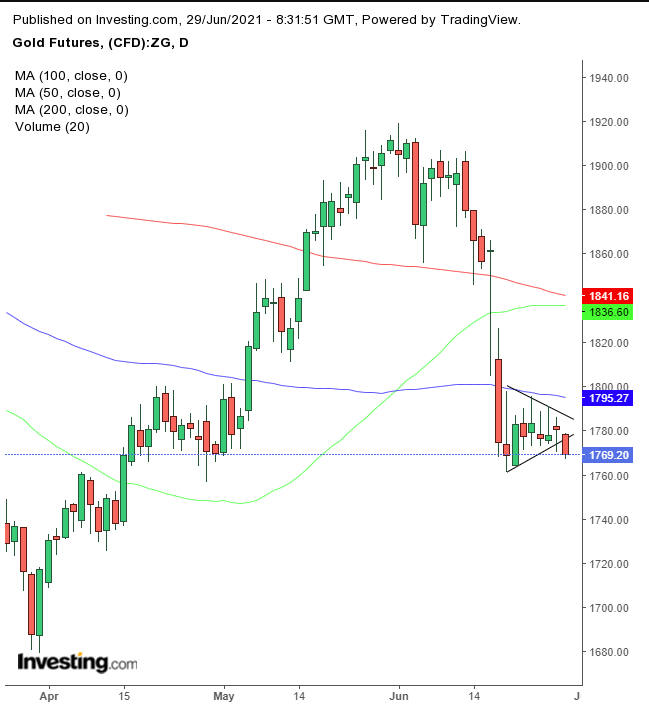
However, at the same time the yellow metal's 50 DMA is finding resistance by the 200 DMA, which if completes, will signal another leg lower.
Bitcoin crossed above $35,000 for the first time in a week-and-a-half.
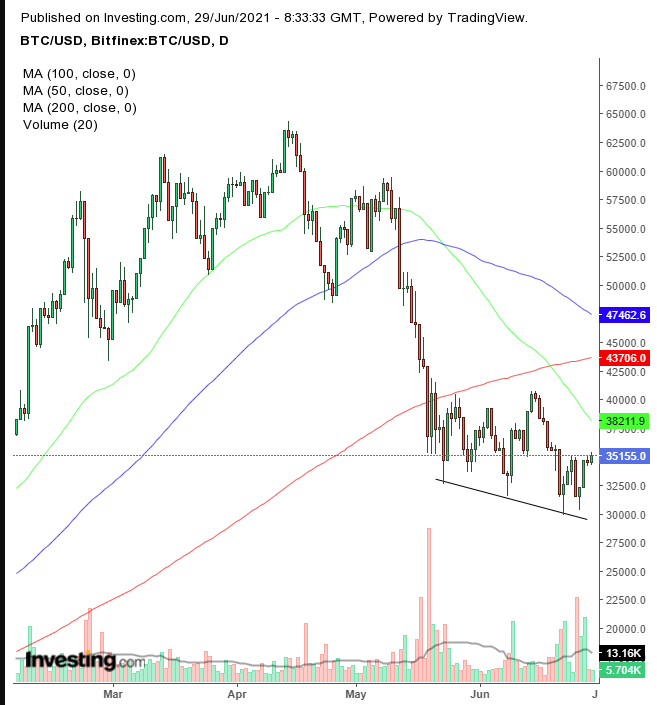
Nevertheless, we’re still concerned it will complete a H&S continuation pattern, suppressed by the Death Cross.
Ethereum, too, is climbing to its highest level since June 2020.
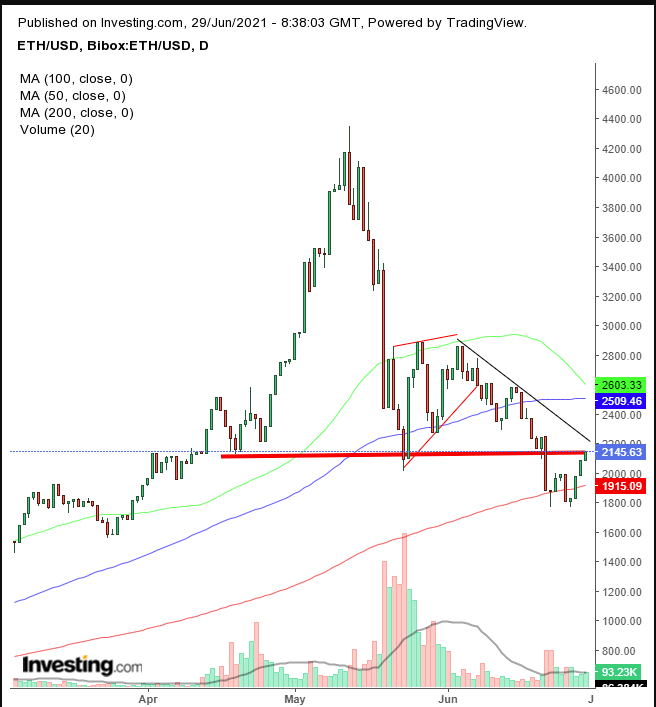
However, the crypto may be testing the bottom of a H&S neckline, having completed a bearish wedge. Note, despite the recent rise, ETH has suffered a record outflow of $50 million.
Oil fell for the second day, for the first time in two weeks, ahead of Thursday's OPEC+ meeting, when the group is expected to increase output by 555,000 barrels, according to a Bloomberg survey. That's not even a quarter of the global deficit that the cartel itself anticipates during the month. Despite that limited increase the WTI price is still faltering.
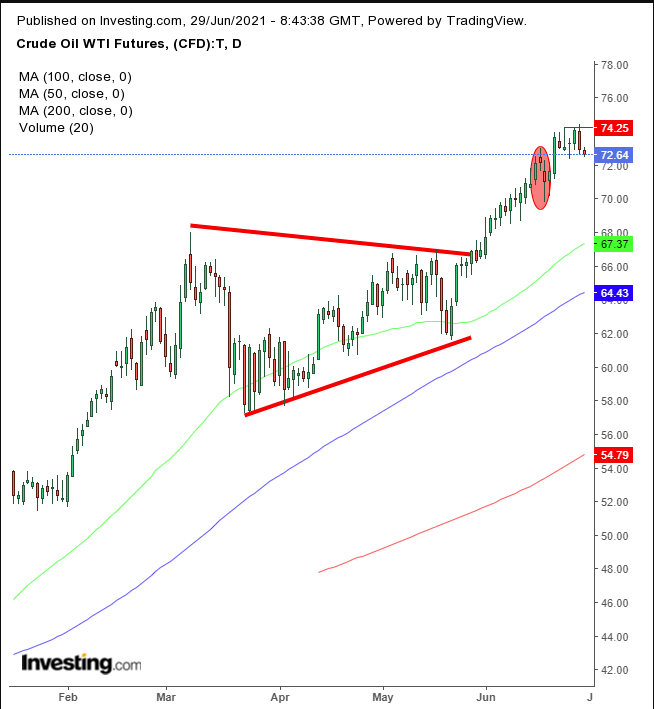
The price has been unable to take on the $75 level, creating repeated bearish patterns, increasing the likelihood of a return-move toward the bullish triangle, to regroup, before taking on the $75 levels again. For now, the oil price is likely to wait and see what the producers have to say on Thursday.
